|
During the Exam Review Day (Tues/Wed.) your APHG class will be going on a field trip to the Woodlands Waterfront Park.
It will be HOT so bring water and sun protection (i.e., sunscreen, hat). You will have a concept "scavenger hunt" to complete. It is worth a "summative" score. For some of you that are within 1 point of the next grade level, this could make the difference in your final grade for the semester. Please meet your class at the HS steps at the start of class--we will depart promptly at the start of your APHG block. Don't be late!!! B3: Tuesday, May 28th. We will depart promptly at 12:10pm A4: Wednesday, May 29th. We will depart promptly at 10:15am A2: Wednesday, May 29th. We will depart promptly at 1:40pm
0 Comments
Vote for 2 movies you would like to watch. Google Survey - Movie Selection Bring snacks to the next class! Bring snacks/drinks to share--sharing is caring! Oh, also, please complete the Post AP Exam course reflection & feedback survey Thanks! Today we will prep for the Mock FRQ + MCQ Exam. There is nothing new I can teach you -- its time to review what you know and learned (or should have learned) for this course. To review, go through your binder (this is why you were asked to keep a binder all year!) If you do not have a detailed binder (or don't have one at all), use the webpages I created for each of the units).You will find a bunch of helpful links on Mock FRQ Hints presentation. There is a copy being provided to each class that you will work on collaboratively for adding review details. The Mock MCQ Review is a vocabulary list--these are terms and concepts you may be tested on. To review for the MCQ--review these concepts. For additional course review material, please look at the information and links provided on the APHG Exam Review webpage HW: Study the FRQ hints + MCQ vocab list
FRQ & MCQ review sessions: Thursday, April 25: FRQ Review: 11:35-12:05 (Stewart); 3:15-4:15 (Coppell) Friday, April 26: 3:30 - 5:30 MCQ + FRQ review (Stewart) Tuesday, April 30: MCQ review 11:35 - 12:05 (Stewart); 3:15-4:15 (Coppell) Bellringer: what should future cities look like?Read the following article:Top 10 Most Well-Planned Cities -- Do you agree with this list? What should be added/removed from the list? We will continue where we left off last class on Urban challenges, including American Suburban challenges and issues with urban sprawl in N. America and U.K. Urban Sprawl Challenges & Solutions: We will also look at potential solutions and possibilities for the future of cities with New Urbanism and 'Smart' City planning and growth. Sustainable City Planning - Cities of the Future: HW: Review for summative mcq + frq
Also, don't forget the binder check! Here's what you should have in your binder:
Bellringer: U.S. geographyU.S. Urban & Inner city challenges
U.S. Suburban challenges
Urban challenges around the world...
Useful Resources: Lecture Slides: Urban Decline & Challenges:
HW: Begin to review Unit 7We will take a look at different models that have been created to explain the type of city layout often found in different regions of the world--these models are based off of many of the world's cities from the 19th and 20th Century. It is important to note their features and the role that history and culture has played in the morphology of the urban landscape. We will start to look at some of the 20th & 21st Century challenges cities face. Today we will focus primarily on challenges of U.S. cities. Helpful Links for Today's Class: HW: Prep for Formative MCQ -- Review HintsToday in class we will finish building our cities (from last class) to bring our city up to the 20th Century. Then we will take a look at different models that have been created to explain the type of city layout often found in different regions of the world--these models are based off of many of the world's cities from the 19th and 20th Century. It is important to note their features and the role that history and culture has played in the morphology of the urban landscape. Helpful Links for Today's Class: Class Activity: B3 Models PPT (you will work within your group to complete your assigned slide for a model) U.S. & European City MOdels:
Non-U.S./European City Models:
HW: Study for Formative FRQNext class, we will begin with a formative FRQ. The topic will be on Central Place Theory and the Urban Realm (topics covered in Fouberg CH. 9).
Today you will be an urban planner tasked to build a city in England--starting in the 18th Century(1700s). Eventually you'll need to plan your city out to the 20th Century. Along the way, you will discover the changes and challenges that villages and towns faced in the ever-changing technology and industrial use of the city. Have pencil and an eraser ready!
HW: Study vocab for Vocab quiz!Next class, we will start with a vocab quiz. Here are Unit 7 "Urban Geography" terms & concepts you should be familiar with:
Helpful Links for today's class:
HW: Read Fouberg CH. 9 "Urban Geography"Read...
Key Issue/Question 1: When and why did people start living in cities? Key Issue/Question 2: Where are cities located and why? |
Note to Students:Bookmark this page so that you can keep up with what is covered in class (esp. if you are absent). Archives
May 2019
Categories |
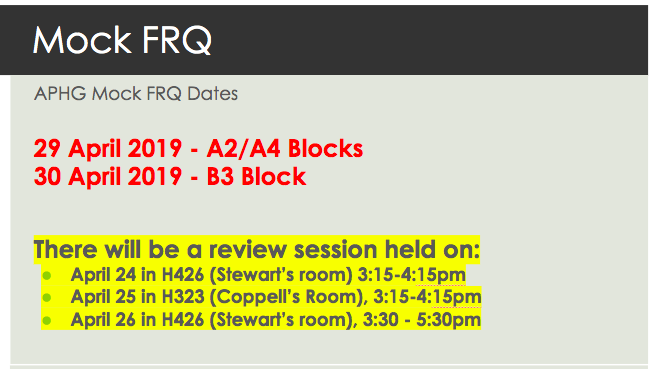
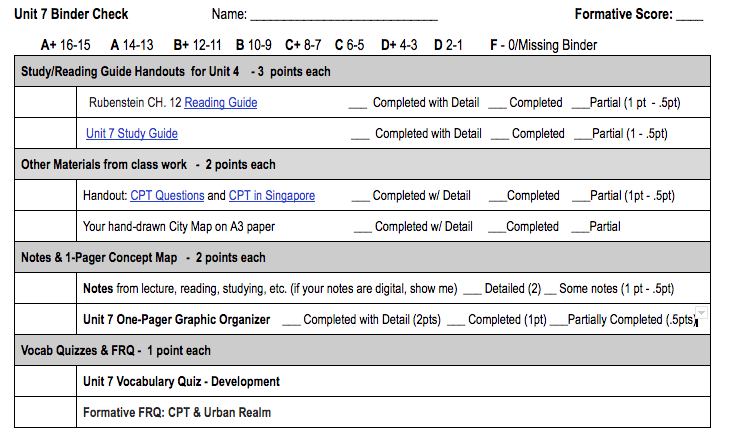
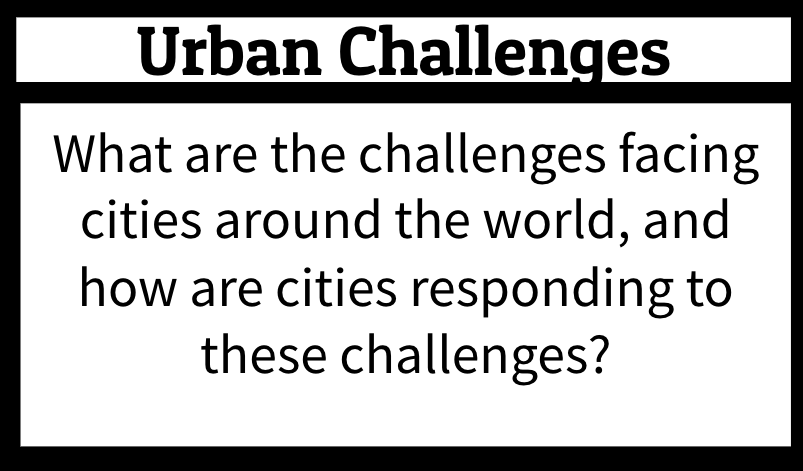
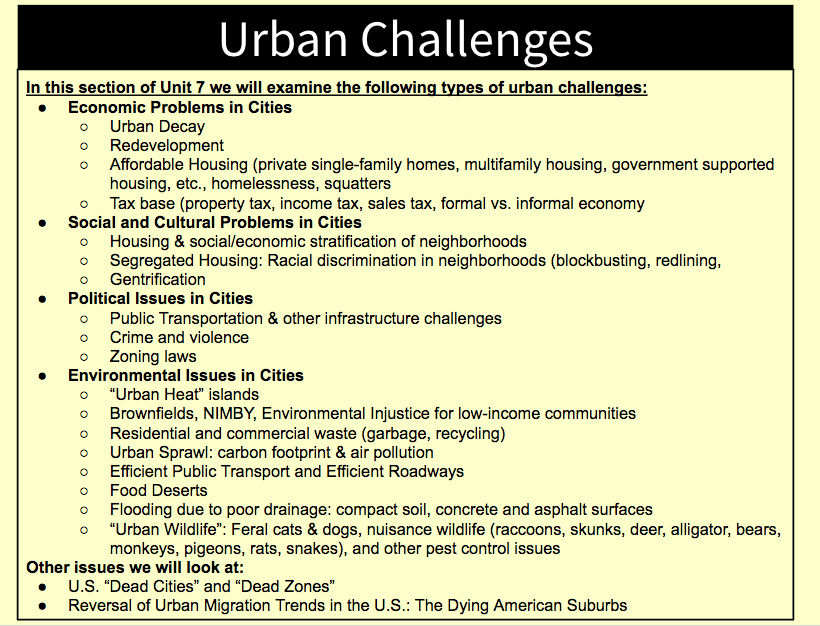
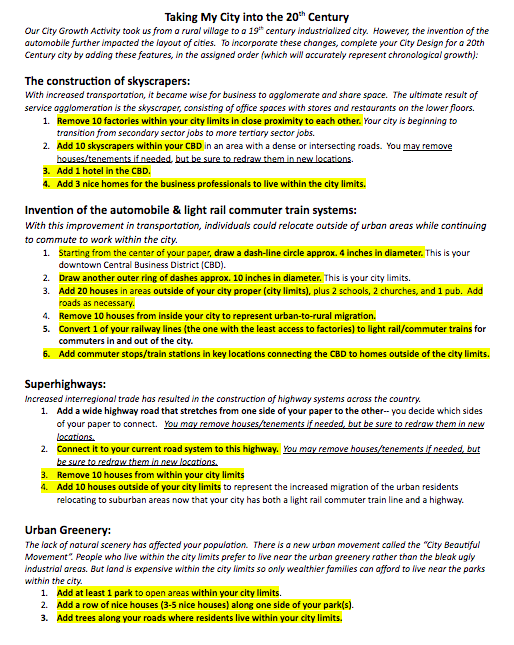
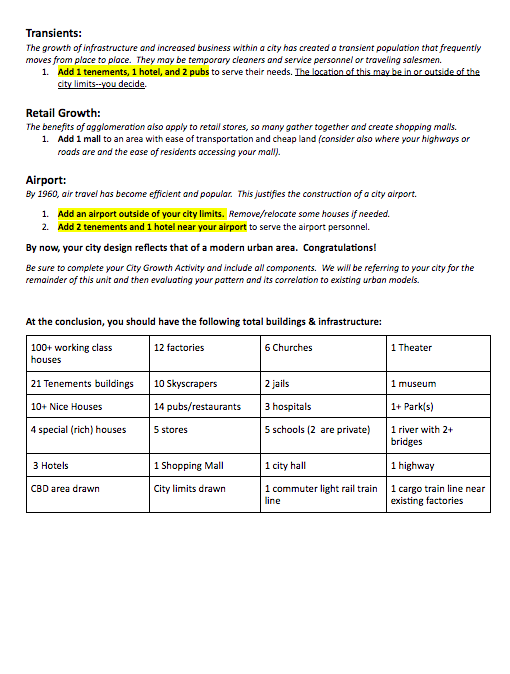
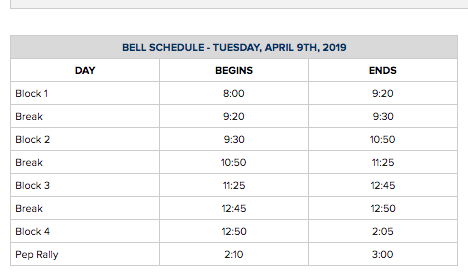
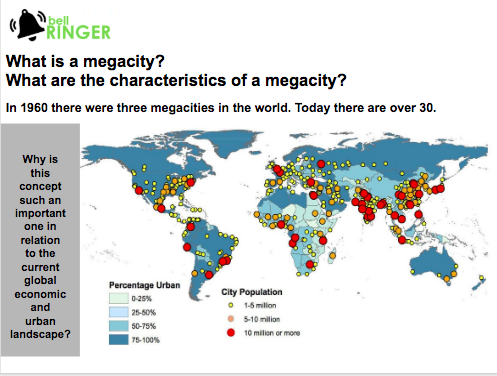
 RSS Feed
RSS Feed